【最新】冀教版七年级英语下册《Lesson1》导学案
精选七年级英语下册Unit1AtriptotheSilkRoad词句精讲精练新版冀教版
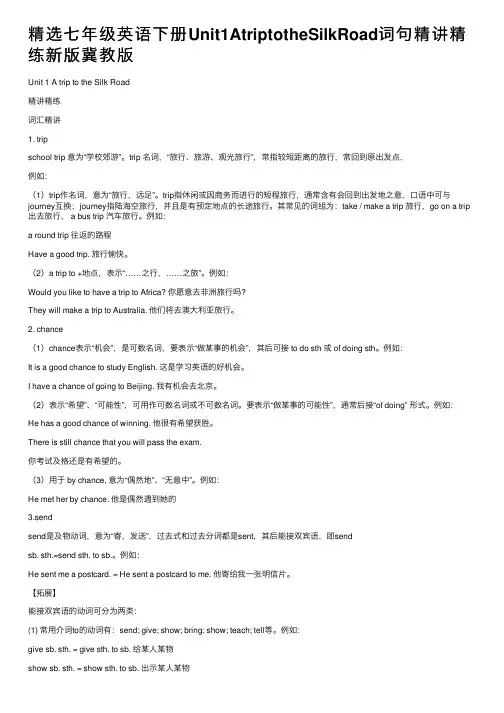
精选七年级英语下册Unit1AtriptotheSilkRoad词句精讲精练新版冀教版Unit 1 A trip to the Silk Road精讲精练词汇精讲1. tripschool trip 意为“学校郊游”。
trip 名词,“旅⾏、旅游、观光旅⾏”,常指较短距离的旅⾏,常回到原出发点,例如:(1)trip作名词,意为“旅⾏,远⾜”。
trip指休闲或因商务⽽进⾏的短程旅⾏,通常含有会回到出发地之意,⼝语中可与journey互换;journey指陆海空旅⾏,并且是有预定地点的长途旅⾏。
其常见的词组为:take / make a trip 旅⾏,go on a trip 出去旅⾏, a bus trip 汽车旅⾏。
例如:a round trip 往返的路程Have a good trip. 旅⾏愉快。
(2)a trip to +地点,表⽰“……之⾏,……之旅”。
例如:Would you like to have a trip to Africa? 你愿意去⾮洲旅⾏吗?They will make a trip to Australia. 他们将去澳⼤利亚旅⾏。
2. chance(1)chance表⽰“机会”,是可数名词,要表⽰“做某事的机会”,其后可接 to do sth 或 of doing sth。
例如:It is a good chance to study English. 这是学习英语的好机会。
I have a chance of going to Beijing. 我有机会去北京。
(2)表⽰“希望”、“可能性”,可⽤作可数名词或不可数名词。
要表⽰“做某事的可能性”,通常后接“of doing” 形式。
例如:He has a good chance of winning. 他很有希望获胜。
There is still chance that you will pass the exam.你考试及格还是有希望的。
冀教版七年级英语下册《Unit 1》单元测试题(解析版)
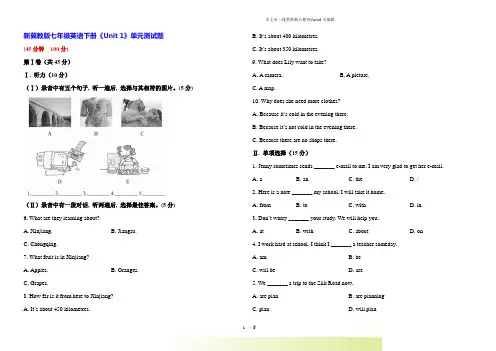
新冀教版七年级英语下册《Unit 1》单元测试题(45分钟100分)第Ⅰ卷(共45分)Ⅰ. 听力(10分)(Ⅰ)录音中有五个句子, 听一遍后, 选择与其相符的图片。
(5分)(Ⅱ)录音中有一段对话, 听两遍后, 选择最佳答案。
(5分)6. What are they learning about?A. Xinjiang.B. Jiangsu.C. Chongqing.7. What fruit is in Xinjiang?A. Apples.B. Oranges.C. Grapes.8. How far is it from here to Xinjiang?A. It’s about 450 kilometres.B. It’s about 400 kilometres.C. It’s about 350 kilometres.9. What does Lily want to take?A. A camera.B. A picture.C. A map.10. Why does she need more clothes?A. Because it’s cold in the evening there.B. Because it’s not cold in the evening there.C. Because there are no shops there.Ⅱ. 单项选择(15分)1. Jenny sometimes sends _______ e-mail to me. I am very glad to get her e-mail.A. aB. anC. theD. /2. Here is a note _______ my school. I will take it home.A. fromB. toC. withD. in3. Don’t worry _______ your study. We will help you.A. atB. withC. aboutD. on4. I work hard at school. I think I _______ a teacher someday.A. amB. beC. will beD. are5. We _______ a trip to the Silk Road now.A. are planB. are planningC. planD. will plan6. —_______ is it from the town to Beijing?—It’s about 1, 100 kilometres.A. How farB. How longC. HowD. How many7. I have a bike only. Please take turns _______ it.A. rideB. ridesC. is ridingD. riding8. —Happy Children’s Day to you!—_______, Mr. King.A. Happy birthdayB. You, tooC. Me, tooD. Thank you9. It’s a nice day. Some people are lying on the beach and _______ the sun there.A. enjoyingB. seeingC. lookingD. playing10. I can’t see the blackboard. Because a tall boy is _______ me.A. in the front ofB. in front ofC. besideD. behindⅢ. 完形填空(10分)My name is Jack Wilson. I am from Canada. It’s 1 from Shijiazhuang. I am 13 years 2 . I am a schoolboy. I know China is a great 3 . I want to 4about China. I plan to go on a 5 to China. There are three 6 students in my school. Our teacher says 7 of the best classes can travel to China. I hope it’s my class. My 8 are from six countries. They have different culture. There are five Chinese students here in my class. They 9 us something about the Silk Road. We are interested in China. I think it will 10 an amazing trip.1. A. far B. nearC. nextD. come2. A. long B. tallC. oldD. /3. A. country B. cityC. towerD. town4. A. go B. readC. learnD. say5. A. travel B. tripC. tourD. book6. A. hundred B. hundredsC. hundred ofD. hundreds of7. A. one B. someC. allD. any8. A. parents B. teachersC. classmatesD. cousins9. A. talk B. sayC. speakD. tell10. A. is B. are C. be D. /Ⅳ. 阅读理解(10分)Mr. Wang is a teacher. He has a son and a daughter. His children like to travel very much. Mr. Wang and his family are going on a trip to England. This is their plan.First, they leave for Beijing by train. The train arrives in Beijing at two o’clock on March 30. Then they will leave the train station and go to the airport by car. They’ll take a plane to Hong Kong first and then change a plane to England. The plane arrives in Hong Kong at six o’clock on the night of March 30. Ten hours later, they reach England. Then the family will take a bus to London. They will arrive in London at night and stay there for a week. Then they will come back to China.根据短文内容判断句子正误(T/F)。
【冀教版】七年级英语下册:Unit 1 A Trip to the Silk Road全单元教案
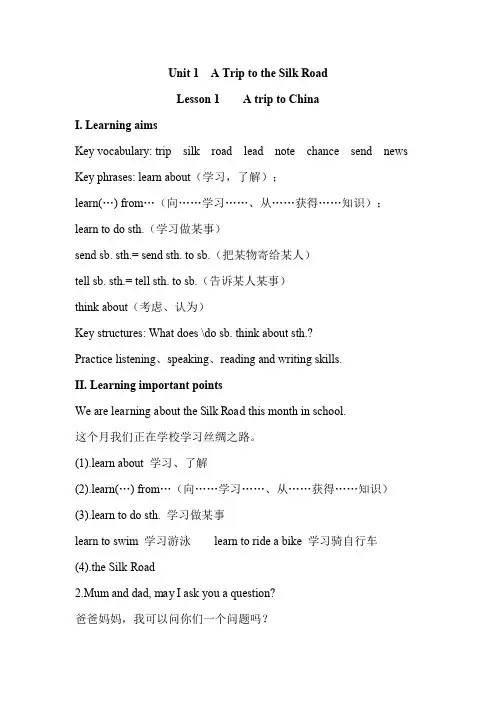
Unit 1 A Trip to the Silk RoadLesson 1 A trip to ChinaI. Learning aimsKey vocabulary: trip silk road lead note chance send news Key phrases: learn about(学习,了解);learn(…) from…(向……学习……、从……获得……知识);learn to do sth.(学习做某事)send sb. sth.= send sth. to sb.(把某物寄给某人)tell sb. sth.= tell sth. to sb.(告诉某人某事)think about(考虑、认为)Key structures: What does \do sb. think about sth.?Practice listening、speaking、reading and writing skills.II. Learning important pointsWe are learning about the Silk Road this month in school.这个月我们正在学校学习丝绸之路。
(1).learn about 学习、了解(2).learn(…) from…(向……学习……、从……获得……知识)(3).learn to do sth. 学习做某事learn to swim 学习游泳learn to ride a bike 学习骑自行车(4).the Silk Road2.Mum and dad, may I ask you a question?爸爸妈妈,我可以问你们一个问题吗?May I…? 此句式表达有礼貌地请求对方允许,语气十分委婉,还可以表达为:Could I \ Can I?其肯定回答常用:Yes.可以。
\ Sure.\ Certainly.当然可以。
7A冀教版河北初中英语-u1_lesson1【声音字幕同步PPT】
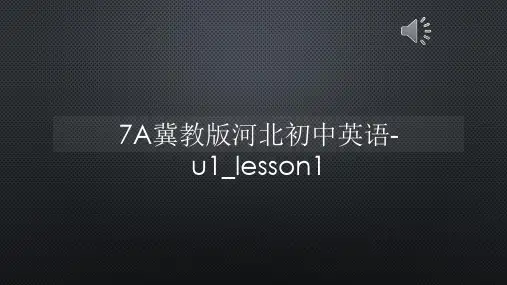
Hi!嗨! My name is Wang Mei.我的名字叫王眉。
How are you?你好吗? I'm fine.我很好。 And you?你呢?
I'm good, thanks.我很好,谢谢你。 Nice to meet you.很高兴见到你。 Nice to meet you, too.也很高兴见到你。
My name is Sue. ቤተ መጻሕፍቲ ባይዱello, hello,
how are you?
Fine.
Nice to meet you. (歌曲)
7A冀教版河北初中英语u1_lesson1
Unit 1 第1单元 lessons 1-6第1-6课 School and Friends学校和朋友 Lesson 1: Hello!1. Hello!//第1课:你好!
Part 1 Hello 1. 你好 Hello, I'm Li Ming! 你好,我是李明。
I'm from China.我来自中国。 Hello, I'm Jenny! 你好,我是詹妮! I'm from Canada.我来自加拿大。
Hello, I'm Danny! 你好,我是丹尼! I'm from Canada, too.我也来自加拿大。
Part 2 How are you?2. 你好吗? Hello, I'm Li Ming!你好,我是李明! What's your name?你叫什么名字?
Let's do it!我们来做! 1. Listen and sing along.1. 听录音并一起唱。
Hello, hello, how are you? What's your name? My name is Joe.
2020版七年级英语下册Unit1ATriptotheSilkRoadLesson1ATriptoChina课件(新版)冀教版
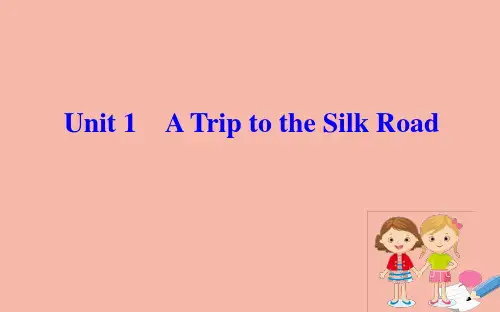
肯定 Yes, you may/can. 回答 Yes, please.
Sure/Certainly/ Of course. 否定 No, you can’t. 回答 Sorry, you can’t.
You’ d better not.
Step 3 考点·练 ( D )①(2019·宿迁中考)—Mum, may I go to see a film with my cousin? —You ________go if you have finished your homework. A. must B. need C. should D. can
5. 学习; 了解 _le_a_r_n_a_b__o_u_t
6. 由……制成 _b_e_m__a_d_e_o_f_
7. 有机会做
_h_a_v_e_a__c_h_a_n_c_e_t_o_d__o_. _. _. _
8. 寄给某人某物 _s_en__d_s_b_._s_th__. _/s_e_n_d__st_h_.__to__s_b_.
【拓展】 lead的名词形式leader 意为“领导者; 领袖” Chairman Mao was a very great leader. 毛主席是一个非常伟大领袖。
Step 4 考点·练 ①Mr Li often _le_a_d_s_ us to the park to have a picnic. ②这条小路通向一个村庄。 This path _le_a_d_s_ _to_ a village. ③张老师将会带领这个小组去北京。 Mr Zhang _w_i_l_l _le_a_d_ the group _to_ Beijing.
Ⅲ. Read the dialogue and answer the questions. 1. What’s Jenny learning about this month in school? _S_h_e_i_s_l_e_a_rn__in_g__a_b_o_u_t_t_h_e_S_i_l_k_R__o_a_d_(_t_h_is_m__o_n_t_h__in_ _s_ch__o_o_l)_. _
冀教版七年级英语下册教案
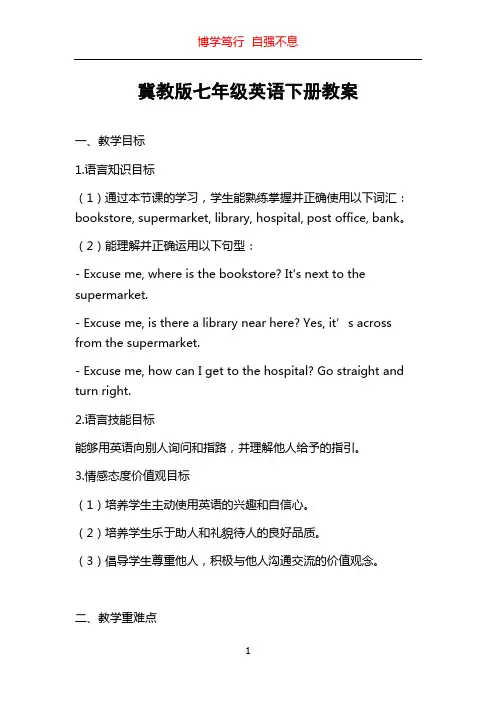
冀教版七年级英语下册教案一、教学目标1.语言知识目标(1)通过本节课的学习,学生能熟练掌握并正确使用以下词汇:bookstore, supermarket, library, hospital, post office, bank。
(2)能理解并正确运用以下句型:- Excuse me, where is the bookstore? It's next to the supermarket.- Excuse me, is there a library near here? Yes, it’s across from the supermarket.- Excuse me, how can I get to the hospital? Go straight and turn right.2.语言技能目标能够用英语向别人询问和指路,并理解他人给予的指引。
3.情感态度价值观目标(1)培养学生主动使用英语的兴趣和自信心。
(2)培养学生乐于助人和礼貌待人的良好品质。
(3)倡导学生尊重他人,积极与他人沟通交流的价值观念。
二、教学重难点1.教学重点(1)通过本节课的学习,学生能熟练掌握并正确使用目标词汇。
(2)能够理解并正确运用目标句型进行日常对话。
2.教学难点学生能够正确使用方向词汇和表达方式,能够正确指引和理解他人的指引。
三、教学过程1.导入新课(1)与学生进行问候和日常交流,温暖和谐的氛围中进入新课教学。
(2)通过一段简短的对话,引入本节课要学的单词和句型。
让学生根据上下文理解单词的意思,并理解句型的用法。
2.新课讲解(1)引导学生通过图片、实物等进行词汇的学习与讲解,并与学生一起朗读和记忆。
(2)通过图片展示和实际案例,向学生展示目标句型的用法和结构,并进行示范齐读和分角色朗读。
(3)引导学生分组练习并巩固句型。
进行角色扮演,让学生在实际情景中运用所学句型进行对话练习。
3.练习巩固(1)设计一些游戏和练习,巩固学生所学的词汇和句型。
冀教版英语七下第一单元知识点
Unit 1 单元知识点Lesson 1 A Trip to China 1.We ’re learning about the Silk Road this month in school.learn v. ________learn about ________,_______,_______learn from _______,_______ eg. The students _____________ Chinese history last week.上星期学生们学生们学习了中国历史。
2.May I ask you a question?情态动词(may,can,must...)+ doMay I...?表示“_________”用来征求对方同意。
May 是情态动词,后跟第一人称 I 或 we .否定回答 No,________./Sorry,______________./______________.eg. ______ go to the park? 我可以去公园吗?3.My school is planning a trip around China with Li Ming’s school.n.计划,打算 make a plan for 为...制定计划v.计划,打算 ______________ 计划做某事eg. He ________ visit his uncle next month. 他计划下个月拜访他的叔叔。
4.Who will lead the trip?lead v._______,_____________...___... 把...带到...eg. Who will lead the trip? 谁将带领这次旅行?I will ______ you ___ the waiting room. 我将带你到等候室。
5.I will send Li Ming an e-mail and tell him the good news.班级__________姓名__________①send v. ______,______send sb.sth. = send ____ ____ ____ 给某人送某物eg.I want to send my mother a letter.= I want to send a letter to my mother.②news n.新闻,消息______名词I have some good news. 一则新闻_________ news两则新闻_________ news6.Is the Silk Road made of silk?由...制成be made ______(看出原材料-物理变化)be made ______ (看不出原材料-化学变化)eg. Books are made ___ paper. 书由纸制成。
七下英语冀教版第一课知识点
七下英语冀教版第一课知识点In the first lesson of Book Seven of the English curriculum in Hebei Education Edition, students are introduced to the topic of "Meeting My Classmates." This lesson focuses on helping students become familiar with their classmates and developing a sense of belonging within the class. By engaging in activities such as introducing themselves, sharing their interests, and listening to each other, students are able to build connections and create a positive classroom environment.在冀教版七年级英语教材的第一课中,学生们开始接触“与同学见面”的话题。
这节课的重点是帮助学生熟悉同学们,建立起对班级的归属感。
通过介绍自己、分享兴趣和倾听他人等活动,学生们能够建立联系,营造积极的课堂氛围。
One of the key aspects of this lesson is encouraging students to communicate with their classmates. By asking questions, listening actively, and responding with interest, students can improve their communication skills and develop relationships with their peers.Communication is essential for building friendships and working collaboratively in a classroom setting.这节课的一个关键方面是鼓励学生与同学们交流。
冀教版初中英语七年级下册《Unit 1》复习课件
三、重点短语
1. go on a trip to sw. have a good trip
5. The mountain is 8848.13 metres high. How high is the mountain ?
6. The Great Wall is over 2,000 years old.
How old is the Great Wall ?
7. exciting 与excited 主语为人,用excited,同时构成短语be excited 意为
your left.
二、重点动词结构
1. have a chance to do sth. 有机会做某事
I have a chance t__o__s__e_ e(see) the Beijing Opera.
2. enjoy doing sth.
喜欢做某事
My father enjoys _r_e__a_d__i_n__g_ (read) newspaper.
2. How far is it from …to…?
2945 km 1100 km
643 km
1114 km
3. The Silk Road is about 6,500 kilometres long. How long is the Silk Road ?
4. The road is about twenty metres wide. How wide is the road ?
冀教版英语七下Unit1《Lesson1ATriptoChina》精品说课稿
冀教版英语七下Unit 1《Lesson 1 A Trip to China》精品说课稿一. 教材分析冀教版英语七下Unit 1《Lesson 1 A Trip to China》是一篇介绍中国旅游景点的阅读文章。
通过讲述一位美国学生在中国旅游的经历,让学生了解中国的自然风光和文化遗产,提高他们的英语阅读能力。
教材内容丰富,插图精美,激发学生学习兴趣。
二. 学情分析七年级学生已具备一定的英语基础,对日常生活和简单的人文知识有所了解。
但他们在阅读长篇阅读材料时,可能会遇到生词和语法难点。
因此,在教学过程中,需要关注学生的个体差异,调动他们的学习积极性,帮助他们克服学习困难。
三. 说教学目标1.知识目标:让学生掌握文章中的关键词汇和语法知识,提高阅读理解能力。
2.能力目标:培养学生的英语听说能力,使他们在日常生活中能运用所学知识进行交流。
3.情感目标:激发学生对中华文化的兴趣,增强他们的民族自豪感。
四. 说教学重难点1.重点:文章中的关键词汇和语法知识。
2.难点:理解文章内容,运用所学知识进行实际交流。
五. 说教学方法与手段1.交际法:通过小组讨论、角色扮演等形式,让学生在实际语境中运用英语。
2.情境教学法:利用图片、视频等资源,创设生动直观的学习情境。
3.任务型教学法:引导学生参与各种实践活动,提高他们的综合语言运用能力。
六. 说教学过程1.导入:展示中国旅游景点的图片,引导学生谈论自己喜欢的景点,激发学习兴趣。
2.阅读理解:让学生阅读文章,回答相关问题,检测他们对文章内容的理解。
3.词汇学习:讲解文章中的关键词汇和语法知识,让学生进行实际操作,巩固所学。
4.口语练习:分组进行角色扮演,让学生将所学知识运用到实际交流中。
5.听力训练:播放与文章相关的听力材料,提高学生的听力水平。
6.写作练习:让学生根据文章内容,写一篇关于中国旅游景点的短文。
7.总结与拓展:对本节课所学内容进行总结,引导学生进一步了解中国文化。
- 1、下载文档前请自行甄别文档内容的完整性,平台不提供额外的编辑、内容补充、找答案等附加服务。
- 2、"仅部分预览"的文档,不可在线预览部分如存在完整性等问题,可反馈申请退款(可完整预览的文档不适用该条件!)。
- 3、如文档侵犯您的权益,请联系客服反馈,我们会尽快为您处理(人工客服工作时间:9:00-18:30)。
新冀教版七年级英语下册《Lesson1》导学案Lesson 1 A Trip to China
学习目标
Words: trip ________ silk________ news________ note________ chance________ road________ send________ lead________ Phrases :
1.学习;了解learn about.
2. 丝绸之路the Silk Road
3.去…旅行go on a trip to…=take a trip to…
4.制定…的计划make a plan for…
5.带/引某人去某地lead…to…
6. 给某人留便条leave sb. a note
7.有做…的机会have a chance to do sth. =have a chance of doing sth
8.一个好消息a piece of good news;
Sentence structures:
1. 猜猜看Guess what;
2.My school is planning a trip around China with Li Ming’s school.
3.This is a good chance for you.
4.I will send Li Ming an e-mail and tell him the good news.
过程与方法:
自主学习、合作探究、讨论练习
重点:
掌握并运用一般将来时。
难点:掌握并运用一般将来时
知识链接:了解丝绸之路。
学习流程
一.自主预习:
(一)轮阅读做题目。
词汇学习
1. Here is a good ________________(机会) for you.
2. ________________________(丝绸之路) has a long history.
3. Here is the ________________(短信) from school.
4. How much ______________(消息) did you get from him?
5. -Who_______________(带领) the trip?
–Mr. Martin will.
6.No news_________(be) good news.
7.They invite me______________________________(去…旅行) Beijing.
8.Mother wants him________________________(了解)their country. (二)轮阅读找难点.学习建议在文中勾画出重点单词,短语和句型。
二、【互动探究,合作求解】
探究一:1.语法讲解——一般将来时(表示将来某个时间发生的动作或存在的状态)
①构成will + do(动词原形)
②常见的时间状语:tomorrow明天; next…下….-如:next week下周;
next year明年;soon 尽快;tonight=this evening 今晚;someday 有朝一日;in the future 在未来
③变一般疑问句,把will提前。
回答时用Yes, sb. Will.
或No, sb. won’t.
Eg. The girl will watch TV.
–Will the girl watch TV? Yes, she will. No, she won’t.
④含有will的句子变否定句,在will 后加not,即will not = won’t. Eg. The girl will play. –The girl won’t play.
跟踪练习:
①My brother _________________(fly) to Beijing tomorrow.
②______the boy_____________(watch) the film tonight?
③They______________(not play)basketball with us next week.
④Her father will help me.(变一般疑问句,作肯定和否定回答)
___________________________________________________________ ⑤Mom will buy some apples. (变否定句)
探究二:May I ask you a question?
May I….? 表达有礼貌的请求。
肯定回答:Yes, you may. 还可以用Sure, Certainly, Of course. 否定回答:No, you may not. 还可以用Sorry, you can’t. You’d better not.
探究三:My school is planning a trip around China. 我们学校正计划周游中国的旅行。
①“旅行”辨析:rip 侧重短途旅行;travel 泛指旅行的过程,尤其
指出国等长途旅行。
②around为“遍及,全”,相当于all over, 后加地点。
around the world =all over the world全世界
探究四:I will send Li Ming an e-mail. 我将给李明发电子邮件。
把某物寄给某人:send sb. sth. = send sth. to sb. (双宾语——直接宾语指物,简称“直物”;间接宾语指人,简称“间人”)
注意:在上述结构中,当“直物”为代词it或them时,只能使用加介词to或for的结构。
把它给我:send it to me (V) send me it (X)
给我买它:buy it for me(V) buy me it (X)
三、课堂检测
单项选择
( )1.Can you give_____.
A. me it
B. it me
C. the book me
D. it to me
( )2.My friend Tom_____a new bike next week.
A. buy
B. buys
C. will buy
D. is buying
( )3.-May we___here?
-Yes, you may.
A. live in
B. live
C. to live D . to live in
( )4.We will __________New York at 4:00 in the afternoon.
A.arrive
B.arrive in
C.arrives to
D.arrive to
( )5.The Bird’s Nest is very beautiful,we ___________it next year.
A.will visit
B.will sees
C.visit
D.to visit
( )6.Mr. Green is __________his ID card,but he can’t _________it.
A.looking for,find
B.looking at,find
C.seeing,looking for
D.finding,look for
()7.Kim is standing ______Wang Mei and Tom.
A.at
B.during
C.between
D.in
()8.-__________I take photos in the hall?
-Yes,you________-.
A.Must,mustn’t
B.May,may
C.Can,can’t
D.Can,won’t ()9.-What are they doing over there?
-They ________weekend activities(活动).
A.plan
B.plans
C.are planing
D.are planning。
